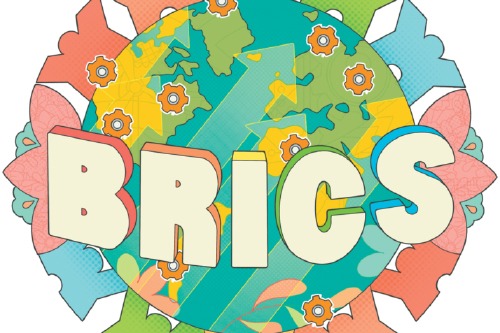Strategic misjudgment
India should realize that depending on and aligning with the US to counter China is Washington's trap

India should realize that depending on and aligning with the US to counter China is Washington's trap

With the normalization of bilateral relations in 1988, China and India reached a strategic consensus and a basic framework to stabilize the bilateral relationship, of which an important part is that both sides uphold independent diplomatic policies and prevent any third party from intervening in bilateral relations.
However, against the backdrop of the United States' strategic competition against China and the rising nationalist sentiment in India in recent years, India increasingly aims to capitalize on the United States' strategic competition with China.
If China-India-Pakistan relationship is a mini-triangular relationship that has regional influence, China-US-India relationship is a large-triangular relationship that has growing global implications. And the US factor to a great extent impacts and shapes India's China strategy, making it more hawkish and adventurous.
To start with, India believes a US-led world order is more conducive to its interests than a China-led one would be.
From India's perspective, the China-US competition is all about the global order. Given that there are still frictions between China and India because of the border dispute, the Tibet issue, etc., India believes that siding with the US is more in line with its own interests. In particular, since the Galwan Valley incident in June 2020, the argument that China has lost India and India should align with the US has become more prominent among the strategic circle in India. Furthermore, India believes the US is more capable of helping it realize the "Indian dream", given the current comprehensive national power gap between China and the US, and that closer relations with the US will give India far more strategic gains than the price it will pay for challenging China.
Second, India believes it could seize the opportunity to profit from the China-US competition.
India holds the view that the current China-US-India relations are similar to the China-US-Soviet Union triangular relations in the later period of the Cold War, thus providing a window of strategic opportunities for India to seek profits from the China-US rivalry. The intensifying China-US strategic competition has enlarged the room for India's strategic speculation.
India is certain of the US' strategic need to woo India to counter China, and makes its hawkishness on China a bargaining chip with the US for greater benefits. And it speculates that China, under mounting strategic pressure imposed by the US, needs to court India. Therefore, it tends to have a hawkish attitude toward China.
Third, India believes it needs help from the US to compete with China.
India always aspires to become a leading power on the global stage. However, despite its progress in national development, India's gap with China in national comprehensive power has been widening, triggering a strong desire to catch up with China. With the country's increasingly strong desire to pursue a greater presence on the world stage, India regards China as impeding its bid to become a permanent member of the United Nations Security Council, while it regards the US as an enabler.
Driven by the aforementioned three factors, India has become more and more inclined to accept the US' strategy toward China or even actively align with it.
Take the border dispute as an example. India has, sometimes tacitly, accepted support from the US side. Several senior officials from the Donald Trump administration revealed that the US government had decided to "provide as much support as we could, based on what India wanted" during the 2020 Galwan Valley incident.
In November 2022, the US and India held a high-altitude joint military exercise, the "Yudh Abhyas 22" (Hindi for "War Practice"), less than 100 kilometers from China's Line of Actual Control along the two countries' border. The exercise, which was clearly targeted at China, focused on surveillance, mountain-warfare skills, casualty evacuation and combat medical aid in adverse terrain and climatic conditions.
In January this year, some anti-China US Senators proposed a resolution on the China-India border issue, agitating for the US to more aggressively engage in the issue. This has been hyped up in India. Obviously, the US will support India through intelligence sharing, equipment assistance, joint military exercises and diplomatic support, making the border issue all the more complicated.
Furthermore, India has showed different attitudes toward multilateral institutions involving the US and China. It vigorously embraces the US-led mechanisms such as the Quadrilateral Security Dialogue but remains lukewarm toward the Shanghai Cooperation Organization and BRICS, in which China has bigger influence.
With regard to the stability of industry and supply chains, India has launched the Supply Chain Resilience Initiative together with Japan and Australia, and joined the US-led Minerals Security Partnership, in an attempt to replace China amid the reshaping of global supply chains.
In terms of global governance, India has displayed a negative attitude toward the initiatives on global governance proposed by China, such as the Global Development Initiative.
In carrying out cooperation with the US, India has its own considerations, which is understandable given that China wishes to have sound, stable relations with the US as well. However, if India counts on depending on or aligning with the US to counter China, it is lifting a rock only to drop it on its own feet.
Historically, India deviated from its non-alignment policy and signed the Indo-Soviet Treaty of Peace, Friendship and Cooperation with the Soviet Union, which is in nature a military alliance pact, laying the ground for its dilemma after the collapse of the Soviet Union. India has learned a hard lesson from this.
In reality, India is the weaker partner in its relationship with the US. According to some US scholars, in the years from 2014 to 2019, only 20 percent of India's votes at the UN General Assembly were in line with those of the US. With the US being the major driving force of China-US-India relations, aligning too closely with the US will erode India's strategic autonomy and worsen Sino-Indian relations. If India loses its strategic autonomy and has a soured relationship with its major neighbor, it can hardly become a leading power on the global stage.
Both major developing nations, China and India have far more common interests than differences, such as in pushing for changes to the global order, safeguarding developing countries' interests, promoting South-South cooperation and advancing their own modernization process. India should not fall into the US' trap of "divide and rule".
The author is executive director and a research professor of the Institute of South Asian Studies at the China Institutes of Contemporary International Relations. The author contributed this article to China Watch, a think tank powered by China Daily.
Contact the editor at editor@chinawatch.cn.


































